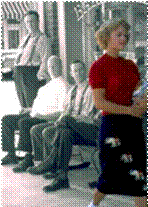November 2009
Remember the 1998 movie “Pleasantville” where the mainstream townspeople passed a resolution making it illegal to teach anything other than the “non-changes view” of history in the schools? The black, grey and white world of this 1950s town – where everything was “pleasant” – was invaded by two teenagers from the 1990s, touching off a revolution in self-expression which resulted in the arrival of color for the first time, setting off a huge outcry for a return to the good old days of certainty, pleasantness, routine, predictability and no color.
We know from systems theory that when a system is facing large-scale change it may tend to act up in strange and unpredictable ways to oppose that change, perceiving it as a threat to its “way of life” or its “view of history” or “the way we have always done things around here.” We may be surprised just exactly how this opposition may show up – the form it takes – but the fact that it does arise shouldn’t surprise systems scholars.
So, we Americans are seeing some pretty extreme opposition to change in our nation’s capitol; some might say bizarre, extremely radical, irrational even bordering on insane. What is worse, from my point of view, is its mean-spiritedness. The inflammatory innuendo, verbal accusations, sarcasm and outright threats of harm are a small step away from actual physical violence.
Is this merely the fundamentalist worldview staunchly refusing anything new, or is it something more sinister, more evil than that? Or has fundamentalism gotten so extreme that it has crossed the line into those darker worldviews we have witnessed a few times in history when collective folly or groupthink convinced all its true believers that they had an exclusive franchise on truth, the “one and only truth.”
Looking at the anger and rage on the faces shown on the news makes me wonder. How can change be so threatening to people, regardless of their ideologies?
One possible explanation, depicted so well in the movie, is that people have never experienced anything different so they fear any change from what they know. This reminds me of Dr. Paul Ray’s research when he discovered the “cultural creatives” subculture in the mid-1990s. This newly emerging subculture consisted largely of people who had had at least one experience of rethinking something, or reframing their worldviews. They had gone through a major paradigm shift in how they thought – at least one – and they survived it! So they would tend to be less threatened by change. Many of the people represented in what Ray calls this “integrative culture” have reframed their worldviews more than once – perhaps regarding civil rights, women’s rights, the environmental movement, human potential and peace movements to name just a few possibilities.
But reframing their worldviews could be a deal-breaker for those adamantly convinced they have the one true way. The mean-spiritedness we see today is probably a misdirected fear of the unknown, but I will leave that to the psychologists and psychiatrists of the world to ascertain. The cries of the” non-changes view” seem to be getting louder and more ridiculous with each day. Don’t be too surprised if the opaque culture of Pleasantville becomes more than a fictional movie and manifests in reality. It wouldn’t be too far-fetched from what we are seeing in the media today.
